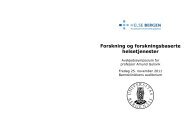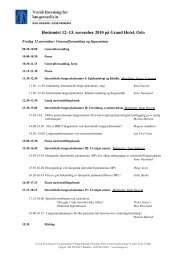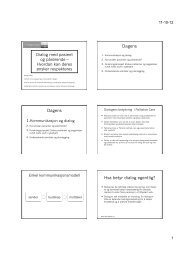Download it here
Download it here
Download it here
Create successful ePaper yourself
Turn your PDF publications into a flip-book with our unique Google optimized e-Paper software.
23-27 August, 2011<br />
Research on bully/victim problems in schoolchildren is well established and t<strong>here</strong> is at least some<br />
consensus on defin<strong>it</strong>ion and measurement issues in regards to trad<strong>it</strong>ional bullying forms. However,<br />
some issues have emerged during the last decade that raise important methodological questions. In<br />
this workshop, we will focus on two topics related to assessment (bullying in younger children, cyberbullying)<br />
and on two topics related to study design and analysis (evaluation of prevention programs<br />
and statistical issues).<br />
First, research on victimization in kindergarten children, or even younger children, is still extremely<br />
rare, especially as compared to the growing l<strong>it</strong>erature on school children. One of the problems met by<br />
researchers doing research on young children is the measurement issue. How can we measure<br />
bully/victim problems in young children Who is the best to tell about <strong>it</strong> Françoise Alsaker and Sonja<br />
Perren have long experience doing research w<strong>it</strong>h kindergarten children and will address the issue in<br />
detail.<br />
Second, the use of electronic media to bully others has increased w<strong>it</strong>h the growing presence of<br />
electronically based communication and the use of the internet for social purposes. However, the<br />
continuously changing technology is a new challenge for research. Sonja Perren and Francoise<br />
Alsaker currently work on a project on cyber-bullying and will inform about methodological problems<br />
and solutions.<br />
Third, many prevention programs have been developed that are aimed at reducing bullying in schools.<br />
Evaluation should be an integral part of the development of such programs. However, the evaluation of<br />
prevention programs is in <strong>it</strong>self a challenge and one should be very careful as to the design of the<br />
study. Christina Salmivalli has led the development and evaluation of the KiVa anti-bullying program in<br />
Finland and will address central issues related to the evaluation of bullying prevention programs.<br />
Fourth, data analyses in bullying research can present a challenge for researchers. Statistical<br />
modeling techniques for the measurement of school-level effects and testing of intervention impact will<br />
be introduced. Scores obtained as compos<strong>it</strong>es from (cyber)bullying and (cyber)victimization scales are<br />
often highly skewed. Methods for dealing w<strong>it</strong>h these data will be discussed. Thérèse Shaw is a<br />
biostatistician w<strong>it</strong>h many years experience in the analysis of cluster randomized trials evaluating health<br />
promotion interventions in schools.<br />
9.15 – 10.30 Methodological issues in bullying research in kindergarten<br />
10.30 – 11:00 Coffee break<br />
11:00 – 12.15 Methodological issues in cyberbullying<br />
12:15 – 13:00 Discussion groups on kindergarten research and cyberbullying<br />
13:00 – 14:00 Lunchtime and informal discussions<br />
14:00 – 15.15 Evaluation of bullying prevention programs<br />
15.15 – 15:45 Statistical issues in bullying research<br />
15.45 – 16.30 Discussion groups on issues related to evaluation and statistics<br />
16.30 – 16.45 Concluding remarks<br />
Workshop III<br />
26<br />
Current issues in behaviour genetics<br />
Organiser: Jim Stevenson, Professor II, Regional Centre for Child and Adolescent Psychiatry,<br />
Univers<strong>it</strong>y of Bergen and Emer<strong>it</strong>us Professor, School of Psychology, Univers<strong>it</strong>y of<br />
Southampton<br />
Bukken<br />
10:00-16:00 The concepts and language of behaviour genetics.<br />
Methods in behaviour genetics:<br />
Model f<strong>it</strong>ting in quant<strong>it</strong>ative genetics<br />
Molecular genetics<br />
Linkage studies<br />
Association studies<br />
State of knowledge of genetic influences on:<br />
General cogn<strong>it</strong>ive abil<strong>it</strong>y<br />
Reading abil<strong>it</strong>y<br />
Hyperactiv<strong>it</strong>y<br />
Autistic spectrum disorders<br />
Debates about gene x environment interactions<br />
Can we make behaviour genetics more “developmental”







